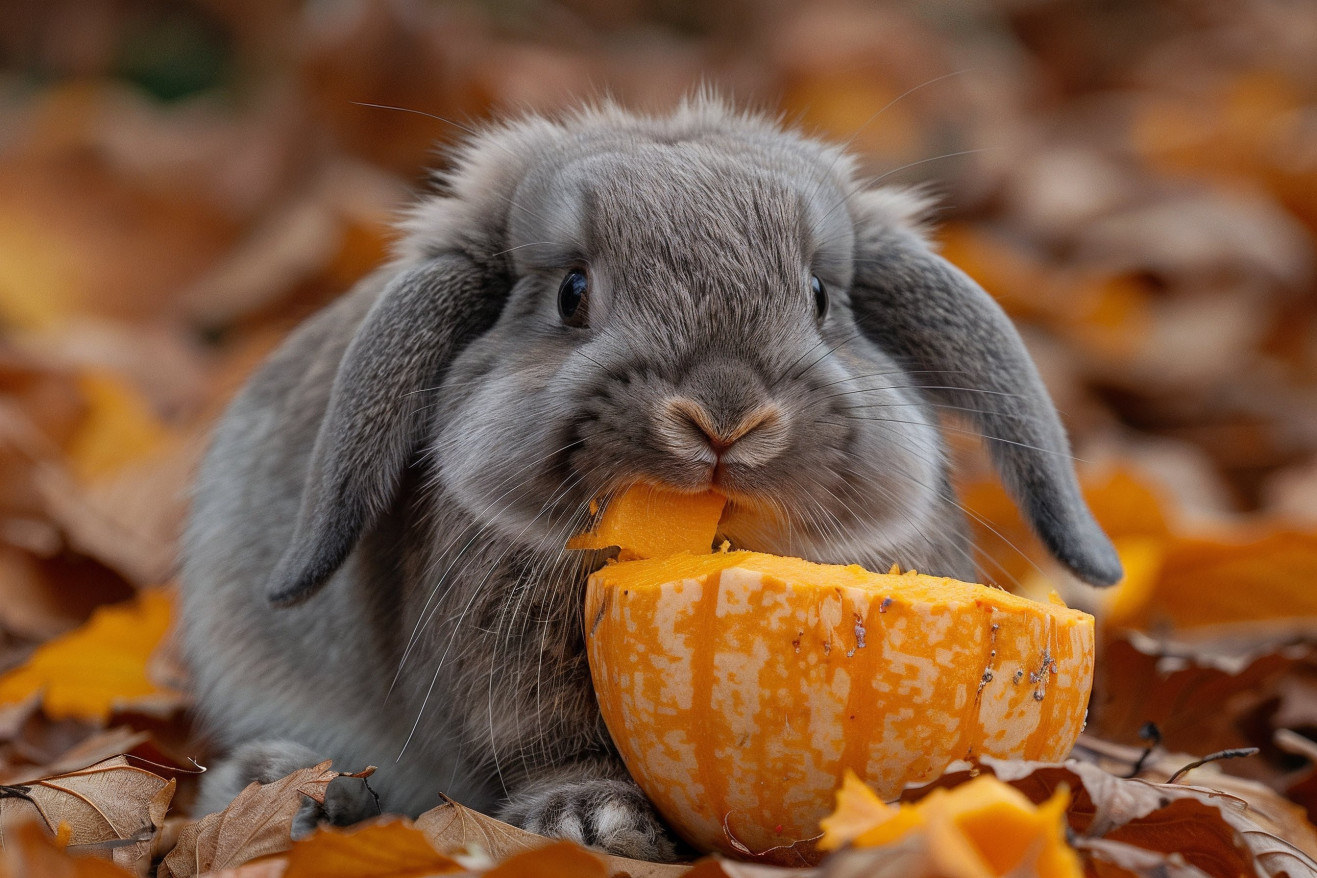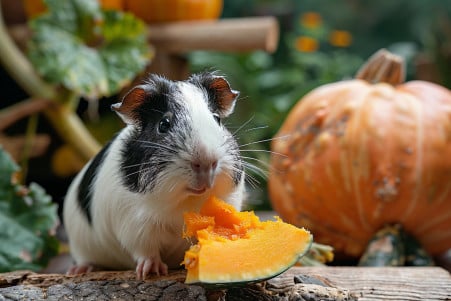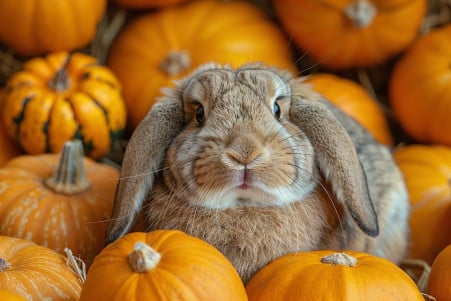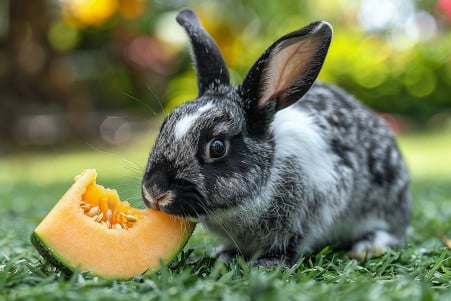Can Rabbits Eat Pumpkin? Safe Feeding Practices Explained
24 February 2024 • Updated 22 February 2024

While pumpkin is a popular fall food for people, you may be wondering if it’s safe to share this seasonal favorite with your pet rabbit. The good news is that rabbits can eat pumpkin as a treat, but there are some important caveats.
The flesh of the pumpkin is safe for rabbits to eat, but the seeds and skin are not. When feeding pumpkin to your rabbit, it’s important to do so in moderation, introduce it slowly, and watch for any signs of digestive issues.
It’s also important to make sure that the pumpkin is only an occasional addition to a well-balanced diet, making up no more than 10% of the rabbit’s daily food intake.
To better understand how to meet a rabbit’s nutritional needs, we’ll take a closer look at veterinary nutrition studies that examine the advantages and potential disadvantages of adding pumpkin to a rabbit’s diet. We’ll look at research on rabbit digestive health, break down the nutritional value of pumpkin, and outline how much pumpkin rabbits can eat in treats to maintain a healthy diet.
Our goal is to offer a complete picture of how to add pumpkin to a rabbit’s diet in a way that won’t negatively impact their health.
Can rabbits eat pumpkin?
How to Meet a Rabbit’s Nutritional Needs
Since rabbits are obligate herbivores, their diet should be made up primarily of high-fiber foods like hay, which is necessary for their health and well-being, according to Veterinary Clinics: Exotic Animal Practice. This is because rabbits have a unique digestive system that has evolved to process large amounts of fibrous plant material.
In addition to aiding in digestion, this fibrous diet is important for dental health since rabbits’ teeth grow continuously and need the abrasion of hay to wear down properly.
While owners can give rabbits treats like pumpkin, they should be given in moderation. This is because rabbits require a large amount of forage fiber and have a digestive system similar to that of monogastric animals, so it’s important to make sure that treats are high-quality and don’t upset their sensitive digestive systems, according to Purina Animal Nutrition.
If rabbits are given too many treats, they can become obese and develop other health problems because they may not be getting the right nutrition.
This means that a rabbit’s diet should be high in fiber and low in fat and sugar. This is important for a rabbit’s well-being since it ensures that their gastrointestinal system works properly and that they stay healthy.
If a rabbit’s diet isn’t balanced, they can develop gastrointestinal stasis, obesity, and malnutrition, all of which can be very serious. Knowing this, it’s important to understand that while rabbits can benefit from eating nutrient-rich foods like pumpkin, it’s important to make sure that they’re getting the right nutrition overall.
Nutritional Value and Health Benefits of Pumpkin
In addition to being a Halloween staple, pumpkins are packed with nutrients that can be good for rabbits when consumed in moderation. Medical News Today explains that pumpkin is low in calories and packed with vitamins and minerals, including beta carotene, which the rabbit’s body converts into vitamin A.
This is important for maintaining a rabbit’s vision and supporting their immune system. Healthline adds that pumpkin is an excellent source of fiber, which is important for a rabbit’s gut health. Fiber helps with digestion and can help prevent common rabbit issues like GI stasis.
That said, while Mayo Clinic Health System points out that pumpkin is high in potassium and vitamin C, it also explains that pumpkin is high in natural sugars and carbohydrates. This means that rabbits can develop health issues like obesity and diabetes if they consume too much sugar. As a result, it’s important to feed rabbits pumpkin in moderation.
Because of its nutritional content, feeding rabbits pumpkin as a healthy treat in small amounts can help balance their primary diet of fibrous foods, ensuring they get the nutrients they need to stay healthy.
How to Give Your Rabbit Pumpkin: A Step-By-Step Guide
To avoid digestive issues, it’s important to introduce pumpkin to your rabbit’s diet slowly. Start with small amounts, like a few teaspoons, and see how your rabbit reacts over the next 24 hours. According to Pet Keen, it’s important to make sure you introduce it safely and watch for signs of indigestion, like diarrhea or bloating.
It’s also important to make sure you prepare the pumpkin properly before you give it to your rabbit. UKPets warns against giving rabbits the seeds and skin of the pumpkin because they can be choking hazards and cause digestive blockages. It’s also best to give your rabbit organic pumpkin to minimize their exposure to pesticides and wax. Once you’ve done this, you can give your rabbit the flesh of the pumpkin.
It’s also important to consider how often and how much pumpkin you give your rabbit. UKPets says you should limit the flesh to 1–2 tablespoons per 5 pounds of body weight, with a maximum of 100 grams a day, and give it to your rabbit no more than 2–3 times a week.
If you follow these guidelines, you can make sure that pumpkin continues to be a safe and healthy treat for your rabbit that won’t throw off their diet.
The High-Fiber Nature of Rabbit Digestion and the Importance of Pumpkin
Rabbits have a unique digestive system that’s specially adapted to help them process fibrous plant material. According to Supreme Petfoods, rabbits eat a lot of grass in the wild, and grass is high in fiber. Rabbit digestion is based on hind-gut fermentation, and a rabbit’s large caecum is the home to the microbes that break down fiber. Rabbits then eat the caecotrophs that contain the microbes to get the nutrients.
A diet that’s high in fiber is essential to help support this highly effective digestive process. Fiber helps ensure that the intestines work well and that food moves through them, which can help prevent GI stasis, a condition that rabbits are particularly prone to. Studies in the journal PMC have shown that pumpkin, which is high in fiber, can help support a rabbit’s digestive health when it’s fed in the right way.
That said, there are also dangers associated with feeding rabbits too much pumpkin, especially because of the sugar and carbohydrates that it contains.
When rabbits eat too much sugar and carbohydrates, they can gain weight and experience digestive upset.
This is why it’s important to feed rabbits pumpkin and other sweet foods in moderation and to make sure that their regular diet is high in fiber and low in sugar so that their digestive systems work as well as possible. If you’re careful, you can feed your rabbit pumpkin and help them get the benefits of its fiber content while also adding some variety to their diet.
How to Feed Pumpkin to Your Rabbit: Tips for Pet Parents
You can add pumpkin to your rabbit’s diet by slowly introducing it. Best Friends Animal Society recommends starting with a small piece of pumpkin flesh—no more than a teaspoon for smaller rabbits—and seeing how your rabbit reacts.
To make sure your rabbit is getting a well-rounded and nutritionally complete diet, you can also add other safe treats like apple slices, blueberries, or leafy greens such as romaine lettuce and arugula, according to VCA Animal Hospitals.
Keeping a regular feeding schedule is important for your rabbit’s health, and regular check-ups can help catch any potential problems early. Kavee also notes the importance of feeding your rabbit treats, including pumpkin, in moderation in The Impact of Treats on Your Rabbit’s Health, so you don’t throw off the balance of their main diet of hay, veggies, and a small amount of pellets.
If you’re thinking about making any major changes to your rabbit’s diet, it’s important to talk to your vet first. They can give you personalized recommendations based on your rabbit’s health status and dietary requirements, so you can make sure your pet is healthy and happy.
Conclusion: Pumpkins & Bunnies, a Healthy Mix of Moderation
In the quest to find healthy treats to supplement our rabbits’ diets, pumpkin is shown to be a good option that is full of important vitamins and minerals that can help with eye, skin, and bone health.
However, the importance of moderation can’t be overstated. As Dr. Kathryn Rosalie Dench explains, while the high water content can help with hydration, the sugar and carbohydrate content means that it should be fed in small amounts, with a maximum of two teaspoons per 5 pounds of rabbit weight, two to three times a week.
Pet Keen also notes the importance of proper preparation and slowly introducing pumpkin to a rabbit’s diet, including making sure that the seeds and skin are removed to prevent digestive issues in these sensitive animals. They also recommend that owners slowly introduce pumpkin and other treats to their rabbits and watch for side effects, including diarrhea and bloating.
According to UKPets, a diet that is 85% grass or hay is necessary to balance a rabbit’s diet and is the most important part of their diet. While pumpkin can be a healthy addition, it should only be a small part of their diet to avoid obesity and digestive issues. A balanced diet for rabbits will help keep them healthy and happy.


